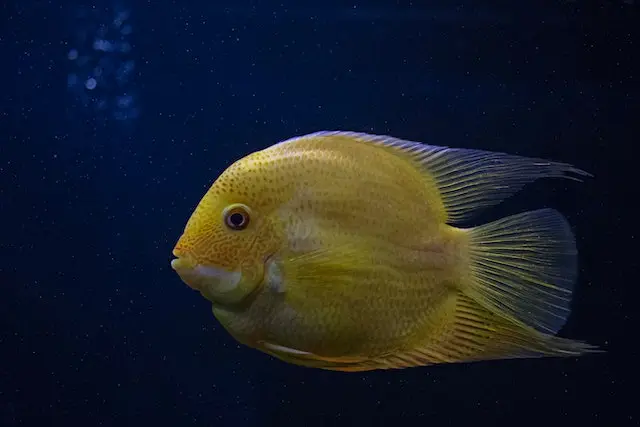If you are reading this article right now, there is a high chance that the fish in your aquarium is more than just a decorative piece. You care for him and have recently been concerned about watching how he swims.
Why is my fish swimming fast back and forth? Isn’t that what you have recently been wondering?
Well, then, you are on the right page. Read on to get all your questions answered here.
Why Is My Fish Swimming Fast Back And Forth?

Your fish are swimming frantically, without any purpose, crashing into the glass and other things in the aquarium. A painful sight indeed, so let’s look at some of the reasons that could result in this.
1. Stress
A stressed fish will show it from the way he swims. He will be near the surface of the water. He will open his mouth more often, and these put together, clearly tell you you have a stressed-out fish.
Now, there are many reasons why you fish and are stressed, and this is what you are, in the course of this article, going to learn and see.
2. Tank Conditions
Rocks, gravel, and plants in the aquarium provide an excellent place to hide but watch out if your fish is rubbing his body against any of them. Chances are this fish has been infected by some unhealthy tank conditions that are causing him to be stressed.
- Water Quality:
If his mouth is above the water’s surface, poor water conditions might have left him gasping for breath. Inadequate water can bring about many toxins, which will only go on to stress the poor fish. Added to this are fluctuations in the water temperature, which can also be very harmful, causing a lot of stress to your fish.
- Tank Size:
Fish, like humans, want their space to move about freely. Some are okay with a decent amount of space, and some territorial ones wish for more freedom. The latter has a high chance of getting stressed and causing the former a lot of stress.
- Tank Mates:
Fish, like humans, can stress each other out, especially when you pair an aggressive and submissive breed. Some fish are more aggressive and bully the smaller fish for this, sending them into hiding or chasing them around.
Must Read: How To Clean A Goldfish Bowl?
3. Illnesses
Examining his body is an effective way to check your fish’s stress level. Fish, when ill, will often turn pale and display a lot of spots and blemishes.
A sick fish will bump or rub against the decor in the tank and even swim in unusual parts of the aquarium. When a fish is stressed, he may lock his fins to his side. Some may even spend time at the bottom of the tank.
4. Breeding Behavior
The onset of breeding behaviors can increase the stress levels in some fish. This could be because of changes in their reproductive state. But don’t worry. This change is mainly short-termed, and your fish will get over it.
Also, some species of fish exhibit fast swimming behavior during breeding season as a way to attract a mate.
5. Hunger or Feeding Habits
Is he eating? If not, chances are you are doing something wrong and need to read up on how to feed your fish properly. Your carnivorous fish need more meat, which means they are on an improper diet, which has left them hungry and stressed.
6. Glass Surfing
Humans are not the only ones who love to pace when restless. A fish swimming back and forth against glass is trying to tell you something is wrong in the tank. Why not check out and see?
This behavior can also be caused by stress, boredom, or a lack of hiding places in the tank.
7. Boredom and Enrichment
Fish can become bored in a tank with little stimulation, leading to erratic swimming behavior. You don’t have too many decorations and aquatic plants that could provide a natural habitat for your fish.
Providing enrichment, such as plants, hiding places, or toys, can help alleviate boredom and reduce stress. Time to shop today, for these, are some much-needed toys that serve as great stress busters for your fish.
What Is Normal Fish Behavior?
A happy fish is a bright and vibrant fish, swimming actively and yet, at a regular steady pace, exploring the many things in the aquarium.
He will eat regularly and attack the food you throw in for him. He will breathe steadily and show you that by expanding his gills regularly.
Stressed Fish Symptoms: How Do You Tell If Your Fish Are Happy Or Stressed?
A painful sight indeed, and a part of you wonders if they could be playing or if this is a sign that he is stressed.
So, if you are in a dilemma like this, the following are some of the signs to look out for.
- Rapid or erratic swimming
- Gasping at the water’s surface
- Loss of appetite or refusal to eat\
- Hiding or spending more time near the bottom of the tank
- Faded or dull coloration
- Clamped fins (fins held close to the body)
- Rubbing or scratching against objects in the tank
- Increased aggression or territorial behavior
- Glass surfing (swimming along the tank’s walls)
- Heavy or labored breathing
- Frequent jumping or attempting to leap out of the tank
Notice any of the above in your fish? Well, then, worry not, for you can permanently cure a stressed fish.
Can A Stressed Fish Recover?
Once the panic has passed, your fish will be back to his usual self again, but this also calls for some effort on your part at the moment and the right amount of precaution so this doesn’t happen in the future.
Remember that you may not always be lucky; fish stress can also be long-term without escape.
So, read on, and see what you need to take care of to protect your fish now and in the future.
How To Calm Down Stressed Fish?
Oh, if only fish could understand our language so we could coax them with words of reassurance. But keep hope, for the following are some things you can do to calm your fish.
- Maintain optimal water conditions:
The water in your aquarium should come with all the proper levels of salt, oxygen, ammonia, nitrate, pH balance, and, not to forget, cleanliness. Getting a freshwater testing kit is one way to get all of this checked.
In addition to that, it should be of the right temperature. Anything gone wrong here could leave your fish stressed.
- Regular water changes:
Only get an aquarium if you have the time for this. An aquarium needs to be cleaned every other week. This is because dirty water can be very stressful for your fish.
Moreover, this can significantly serve as the breeding ground for toxic chemicals and parasites that will only stress out your fish.
- Avoid overcrowding:
So, while you have two favorite breeds, ensure they will get along well. Do the proper research, lest you have the bossy ones giving misery to your weaker fish.
And don’t crowd the tank. Remember that every fish of one inch will need the space of one gallon of water to swim. So, if you believe the more, the merrier, ensure your aquarium is more giant.
- Proper feeding:
Malnourished fish could get sick and stressed, so make sure they are on the proper diet, including plant-based and meat-based food, according to what suits your fish. Do some research on this.
Make sure that you distribute the food evenly. This is more so when you have many fish.
- Enrichment:
Nothing makes a fish happier than good food, so ensure you are putting your best in this. Please find out the most nutritious food according to the breed of your fish, and provide you are evenly distributing it.
- Lower light levels:
A tank in the wrong place can be a great source of misery for your fish. So, ensure you don’t place it under direct sunlight or any other bright light, no matter how beautiful it makes your aquarium and your fish.
- Limit noise:
Yes, believe it or not, but this can affect your fish. That loud metal music you are playing all the time is not a favorite of your fish.
Hiding is common among fish as, like humans, they want a time out, but if this happens more often, chances are you have a fish that is either injured or scared and hence stressed in the tank.
- Gradual changes:
Fish are sensitive beings and can find sudden changes in the aquarium somewhat overwhelming. This can include anything from the habitat that you place them into the transformation of water. Ensure you always do it the right way, with the proper steps, not to cause any stress to your fish.
- Medication:
If you want to treat a sick fish, quarantine him, as this could spare your other fish.
Stress can be fatal. We hope you know this. And your fish are no exception to this. So, pay attention to all the points above to see what you can do for your fish. Please give him a better habitat from today, and turn them into happy fish.
Recommended Reading: Is A Fish Wet In Water?
Frequently Asked Questions: Why is my fish swimming fast back and forth?
Now you know why your fish have been swimming repeatedly to decide what to do about your fish. Before you go, here are a few FAQs that can tell you a final thing or two about your fish.
Q1. Is it normal for new fish to swim up and down?
Ans: It is normal as long as your fish is not overdoing it, is swimming at a regular steady pace, is not banging into things, and, like other common fish, takes time to hide as well as explore among the decor and other things you place inside it. Anything beyond this could mean there is something that is stressing your fish.
Q2. Why is my fish spinning uncontrollably?
Ans: This is likely a sign that your fish is ill and must be taken to the vet immediately. Chances are that his brain is affected, and he is going through an imbalance or neurological disruption. It could also be a problem with his bladder or unhealthy tank conditions resulting in poisoning.
Q3. Why is my fish swimming erratically and then dying?
Ans: This is mainly because of stress and is most often the result of incorrect tank conditions that can severely affect a fish, causing osmosis shock, dropsy, and various other such diseases, which can miserably end the life of your fish. This is why knowing the right way to maintain your aquarium is very important if you have a fish.
Q4. Why is my fish swimming on its side and back?
Ans: Often, the reason for this is a problem with his bladder. This could result from temperature change, the wrong nitrate levels, and other such poor water conditions that we saw above, which are essential to look into regularly. Remember that bladder issues can often be fatal and result in the death of a fish.
Q5. Why are my fish swimming next to each other?
Ans: For one, chances are they are competing for the food you are putting in. But then, do be watchful, for this can also be a sign of stress in your fish. Or it could be an unhealthy pairing because your more aggressive fish are chasing the weaker breeds.
Final Words
Why is my fish swimming fast back and forth? Know that swimming is the only language of the fish, unlike dogs and cats that can bark and wag their tails and lick.
Your fish has no other speech or body language, so if you care for him, one of the best ways to check on him is to keep a close watch on how he swims.



